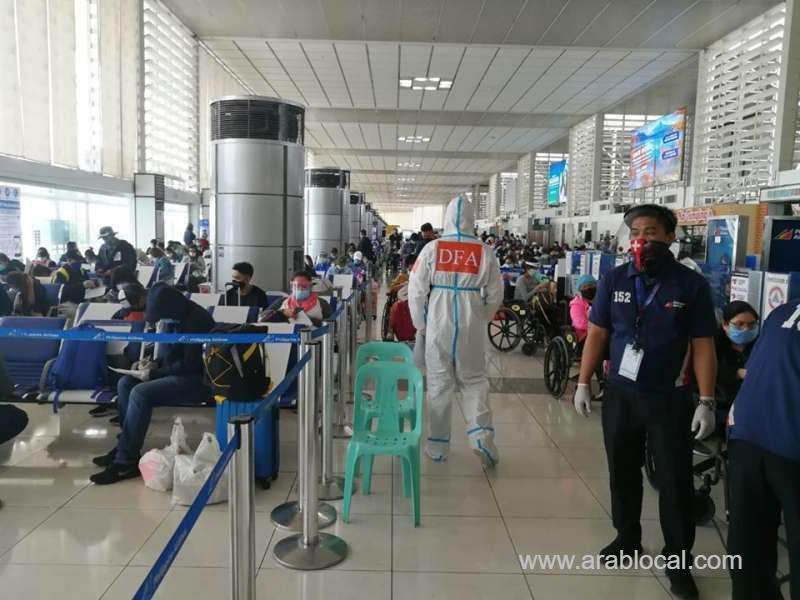Funds for the repatriation of overseas Filipino workers affected by the COVID-19 pandemic may run out by the end of August, officials said on Friday.
Since March 22 the Philippine government has repatriated more than 56,000 of its nationals, most of whom were left jobless abroad due to the global health emergency, and nearly 38,000 more are expected to return in the coming weeks.
Official records show that up to 167,000 Filipino workers are currently stranded in their host countries, with 88,000 of them in Saudi Arabia alone.
While the government says it wants to bring home as many of its nationals as soon as possible, Foreign Affairs Undersecretary Sarah Arriola expressed concerns that the Department of Foreign Affairs’ PHP1 billion ($20 million) assistance fund for workers may be depleted by the end of August.
She said that approximately 66 percent of the budget had already been spent, with only PHP344 million left.
“Our utilization rate is very high,” she told a hearing at the House committee on public accounts. “A chartered flight costs PHP12 million to PHP13 million per flight, and that is only good for 350 passengers.”
But money is not the only issue in the repatriation process, according to the country’s labor secretary.
“In repatriating our OFWs (Overseas Filipino Workers), we also have to consider the lockdowns imposed by countries where they are working,” Labor Secretary Silvestre Bello III said in a statement on Saturday, adding that more funds would not bring nationals home in the absence of other equally important factors.
The “lock-ins” and “lock-outs” in infected countries were still a major obstacle, he said, even if the Philippines opened its doors amid its own COVID-19 restrictions. He also pointed out that there were legal impediments tied to the exit visas, loans and cases of Filipino workers wanting to go home.
“It really gets frustrating when foreign employers refuse to give the exit visas of our OFWs to stop them from returning to the Philippines. There are many employers like that abroad. Repatriation of OFWs also becomes difficult to achieve when they still have loans to settle and complaints to face.”
When asked during Friday’s hearing if bigger funds could boost the government’s efforts to bring home more migrant workers, Bello said no but that it could save many of them from misery.
On Wednesday, Senator Franklin Drilon insisted during a Senate hearing that the Overseas Workers Welfare Administration (OWWA) should use its existing PHP18.8 billion fund to bring home all stranded workers and give them financial and livelihood assistance.
The fund is principally sourced from overseas workers’ membership contributions that could and should be utilized to help migrant workers affected by the pandemic by providing them with adequate assistance, said Drilon, who is a former OWWA chief.
KABUL: The Taliban has denied US media reports claiming a Russian intelligence unit secretly rewarded them for targeting American troops in Afghanistan.
“We have heard these reports and they are false and baseless,” Zabihullah Mujahid, a Taliban spokesman, said in a statement on Saturday.
He added that the group had “neither sought nor received any aid from any country or intelligence agency in 19 years of war.”
Mujahid said the Taliban lack advanced weaponry to carry out sophisticated attacks on US targets, which he said is proof they have not received foreign arms.
“We have used whatever resources we have had in Afghanistan, or prepared, for example, road and car bombs from explosives and materials available locally.”
He said the group has not targeted US forces since the two sides signed a peace deal in Doha in late February. In accordance with the agreement, US troops are set to leave Afghanistan by spring 2021.
Earlier on Saturday, the New York Times and two other American dailies reported that US intelligence officials have concluded that a Russian military intelligence unit secretly offered bounties to Taliban-linked militants for killing coalition forces in Afghanistan and targeting US troops.
“They want to prevent the withdrawal of Americans from here because they will lose the resources and income they have earned from continuing the war, and they want to do everything for their survival,” he said.
While Russia suffered a humiliating retreat after nearly 10 years in Afghanistan in the 1980s, it has joined Iran, Pakistan and China in opposing the US presence in the country.
Although Afghan officials in the past have failed to find direct military links between the Taliban and Moscow, some provincial officials said Russians provided intelligence to the group when it captured the northern city of Kunduz, near the border with Tajikistan, in 2015 and 2016.
Analyst Zabihullah Pakteen said Russia has been a vocal supporter of the Taliban in their war against Daesh. He added that the US report on bounties could refer to events before the Qatar deal and that its leak could be a strategic play linked to the withdrawal of US troops.
“Russian involvement in Afghanistan in giving bounties to kill US soldiers certainly puts pressure on the Trump administration as the US election approaches. The most important aspect of intelligence leaking could be connected to troop withdrawal, so the US would have to stay to confront Russia and other adversaries in the region,” he told Arab News.
The allegation of Taliban-Russian links, which could delay the departure of several thousand more US troops, comes as US President Donald Trump is on the campaign trail, fighting for for a second term in the White House.
SOURCE : CAMEROONMAGAZINE






